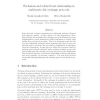Free Online Productivity Tools
i2Speak
i2Symbol
i2OCR
iTex2Img
iWeb2Print
iWeb2Shot
i2Type
iPdf2Split
iPdf2Merge
i2Bopomofo
i2Arabic
i2Style
i2Image
i2PDF
iLatex2Rtf
Sci2ools
113
click to vote
ECRA
2007
2007
Exclusions and related trust relationships in multi-party fair exchange protocols
Some electronic commerce transactions are inherently performed between more than two parties. In this context, it is thus important to determine whether the underlying fair exchange protocols allowing the secure implementation of such transactions enable participants to exclude other entities from a protocol execution. This is an important point that has not been sufficiently addressed when analysing such kind of protocols, and that may be crucial for the successful accomplishment of multi-party electronic transactions. In this paper we define the properties related to exchange protocols and exclusions, study exclusion scenarios on two wellknown multi-party fair exchange protocols and point out the implications that exclusions may have on the trust relationships between participants, and, more generally, on electronic commerce. Two new protocols more robust than existing multi-party fair exchange protocols are therefore proposed.
ECRA 2007 | Electronic Commerce Transactions | Fair Exchange Protocols | Multi-party Fair Exchange |
| Added | 13 Dec 2010 |
| Updated | 13 Dec 2010 |
| Type | Journal |
| Year | 2007 |
| Where | ECRA |
| Authors | Nicolás González-Deleito, Olivier Markowitch |
Comments (0)

